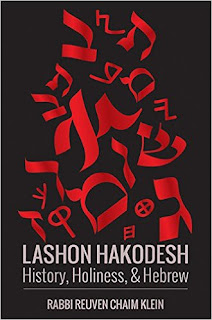A Theology of Holiness
Rabbi Alec Goldstein
Kodesh Press / 258 pp
The secret is out. If you've wondered how Kodesh Press got its name, it's because the founder, Rabbi Alec Goldstein, has spent 10 years looking into the idea of "holiness, kedusha," and he just published his fascinating and exciting new study, "A Theology of Holiness: Historical, Exegetical, and Philosophical Perspectives."
His new book is a study of the idea of kedusha in Judaism. Some of the highlights include a lengthy analysis of the meaning of the root k-d-sh, how Chumash uses the word in context, and how the commentaries understand the word.
He offers five different theories about the phrase "kedoshim tihyu." Simply put:
First, Rashi says it means to keep a "subset" of the commandments, like keeping kosher and observing the laws of intimacy. Second, Rambam says it means keeping all 613 commandments, not just a subset. Third, Ramban says it means to separate even from which is permitted, not just what is forbidden. He calls this "supererogation." Fourth, Rabbi Hirsch says it means to act ethically. Fifth, Abba Shaul in the Gemara says it means imitatio Dei, imitating God.
Throughout the book, he develops the strengths and weaknesses of each of these five positions. He emphasizes these positions are not the same.
Finally, he writes that holiness is both an "obligation" and a "fulfillment." He concludes, "we are commanded to move holiness from the theoretical to the practical, from the potential to the kinetic. Whether holiness means separating from a subset of the laws (Rashi), adherence to all of the commandments (Maimonides), or a life of asceticism (Nahmanides), that call is there, always present and ready to be fulfilled. A person might have inherent holiness regardless of his behavior, but that is the holiness of obligation. The holiness of fulfillment is even greater."
This book quotes a wide array of sources. He quotes from bedrock traditional sources like Rashi, Rambam, Ramban, and Rabbi Soloveitchik. But he also quotes from biblical academics like Jacob Milgrom and Nahum Sarna, philosophers like Nietzsche and Kant, and anthropologists like Marcel Mauss and Emile Durkheim.
Rabbi Goldstein really gets at the core idea of what holiness means from a religious perspective. Since holiness is so central to what it means to be religious at all, this book has a profound impact on Jewish philosophical thought in general.
While the ideas can be complicated sometimes, this book breaks them down. The beginner and trained scholar will both benefit from reading this book.


